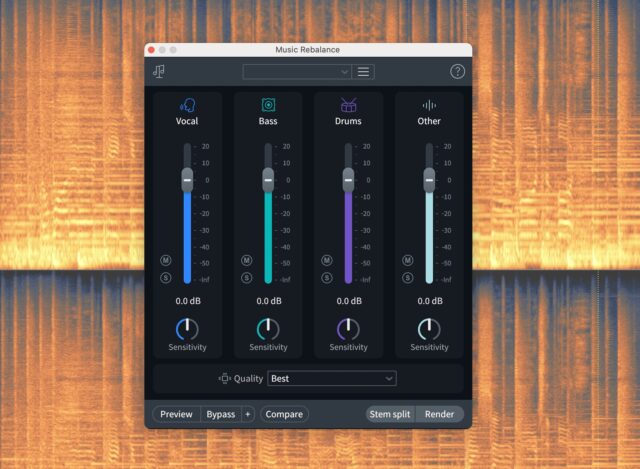Consider an example, from a song I’ve been working on. Here’s a snippet of the full piece:
After running Logic’s original Stem Splitter on the snippet, I was given four tracks: Vocals, Drums, Bass, and “Other.” They all isolated their parts reasonably well, but check out the static and artifacting when you isolate the bass track:
The vocal track came out better, but it was still far from ideal:
Now, just over a year later, Apple has released a point update for Logic that delivers “enhanced audio fidelity” for Stem Splitter—along with support for new stems for guitar and piano.
Logic now splits audio into more stems.
The difference in quality is significant, as you can hear in the new bass track:
And the new vocal track, though still lacking the pristine fidelity of the original recording, is nevertheless greatly improved:
The ability to separate out guitars and pianos is also welcome, and it works well. Here’s the piano part:
Pretty impressive leap in fidelity for a point release!
There are plenty of other stem-splitting tools, of course, and many have had a head start on Apple. With its new release, however, Apple has certainly closed the gap.
Izotope’s RX 11, for instance, is a highly regarded (and expensive!) piece of software that can do wonders when it comes to repairing audio, reducing clicks, background noise, and sibilance.

RX11, ready to split some stems.
It includes a stem-splitting feature that can produce four outputs (vocal, bass, drums, and other), and it produces usable audio—but I’m not sure I’d rank its output more highly than Logic’s. Compare for yourself on the vocal and bass stems:
In any event, the AI/machine learning revolution has certainly arrived in the music world, and the rapid quality increase in stem-splitting tools in just a few years shows just what these AI systems are capable of when trained on enough data. I remain especially impressed by how the best stem splitters can extract not just a clean vocal but also the reverb/delay tail. Having access to the original recordings will always be better—but stem-splitting tech is improving quickly.


